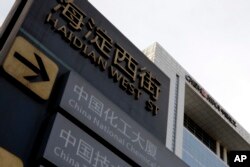Chinese companies are targeting at least 1,000 foreign firms for acquisition in 2016, according to analysts. And they are expected to nearly double what they invested last year, when Chinese business groups took control of 598 companies, according to a financial compiler.
Beijing has already spent about $55 billion in merger and acquisition deals — nearly half of the 2015 expenditure of $118 billion — in the first two months of this year, according to Dealogic, a compiler of financial statistics.
Looking abroad
Chinese companies acquired 25 firms based in the United States and Canada last year, compared to just four in 2014 and nine in 2013. Many more acquisitions are expected this year despite the growing political rhetoric against it, analysts said.
Analysts also said the economic slowdown in China is forcing its major companies to look for greener pastures overseas instead of weakening their acquisition drive. “Given its ongoing slowdown in the domestic economy, it is likely that Chinese corporates would explore the possibilities of looking for avenues to sustain their growth elsewhere,” said Abdul Erumban, senior economist with The Conference Board.
Drawing the most attention is the wrangling involving Chinese conglomerate the Anbang Insurance Group and Marriott International, which are battling to acquire the iconic Starwood Hotels and Resorts for nearly $14 billion. Anbang upped its offer on Monday, leaving the market waiting anxiously for Marriott’s next move.
Some analysts believe the Chinese government is directly orchestrating the buying spree by Chinese business groups.
Government's role
“The Chinese government is certainly encouraging overseas investment in strategic sectors,” said Scott Kennedy, deputy director of the Freeman Chair in China Studies at the Washington-based Center for Strategic & International Studies. “These are areas where China lacks domestic technological know how in projects that could be part of China’s 'Belt & Road' strategy and projects that are part of China’s 'Production Capacity Cooperation' initiative,” he said.
This initiative involves moving China’s excess manufacturing capacity to Africa, Latin America, Europe and elsewhere where the capacity is needed.
The Mercator Institute for China Studies in Berlin, in a recent study, said, “The Chinese leadership has a knack of making foreign investments by Chinese companies look as if they are of mutual benefit; promises of Chinese investment and flows of capital have long been vehicles of Chinese foreign policy."
The Chinese firm ChemChina sparked controversy recently when it acquired Swiss seed maker Syngenta for $48 billion. This caused some concern among U.S. politicians who pointed out that Syngenta’s biotech division in based in the United States. "Because the food and agriculture sectors are part of the nation's critical infrastructure, this merger raises questions about the potential national security implications," U.S. Senator Chuck Grassley told the Financial Times.
US senators express concern
A group of 45 U.S. senators has written to the U.S. Treasury Department's Committee on Foreign Investment in the United States,(CFIUS), expressing concern over a recent deal by a Chinese group to acquire the 134-year-old Chicago Stock Exchange. If successful, this will be the first sale of a stock exchange in the United States.
Chinese media have often complained that U.S. politicians resisted Chinese advances in the business field for political reasons. The politicians are unable to deal with China’s growing financial clout, they said.
Kennedy disagreed. “I do not believe that the U.S. has blocked any Chinese investments simply out of political pique or to protect American companies,” he said, adding, “The vast majority of Chinese investments go through without any review for competition policy or national security concerns. And when they are reviewed, the data shows Chinese investments are no more or less likely to be rejected than investments from elsewhere.”
Some of the deals made by Chinese companies have drawn attention. One is the cash purchase of General Electric’s appliance business by Chinese multinational the Haier Group for $5.4 billion in late January. Another involved the sale of Hollywood filmmaker Legendary Entertainment for $3.5 billion.
Terex, a contractor for the U.S. Departments of Defense and Homeland Security, U.S. Air Force, Army, and NASA, recently entered into a deal allowing China’s Zoomlion to acquire it for $4.9 billion.
“The basic thinking in China is to encourage its major business groups to make money overseas, and bring back the profits in a sort of round trip at this time when the country is going through an economic slowdown,” said David Kelly, head of the research firm China Policy. “The newly acquired companies would become customers for Chinese goods and services, and thus help the local economy. Besides, many Chinese multinationals have a lot of cash to spend,” Kelly said.






